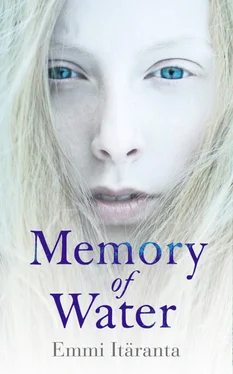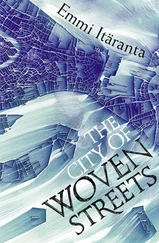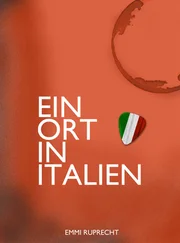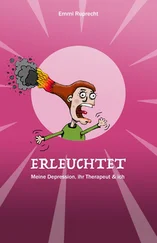‘The pipe is hidden as well as the spring,’ my father remarked. ‘Finding it is nearly impossible without knowing its location.’
‘They’re used to searching, and their machines are intricate.’
‘They have no reason to come back.’
‘They have no reason not to come!’
A silence fell between them. After a moment my father spoke, directing his words only to me.
‘Your mother believes the tea master’s house is no longer a safe place to live.’ He glanced at her and waited. I saw her choose her words carefully.
‘Noria, I’ve been offered a post as a researcher at the University of Xinjing. I’ve accepted.’
‘Are we moving to Xinjing?’ I asked. I didn’t know for sure how far it was, but I knew the journey to the southern coast of New Qian was long. The trip across the continent must take weeks even on the fastest trains. My father and my mother glanced at each other.
‘You’re of age and therefore we can’t make the decision for you,’ my mother said. ‘Do you wish to go to Xinjing with me, or do you want to stay here with your father? You don’t need to decide right now, but I will need to leave before Moonfeast, so it’s only a month away.’
I looked at my mother. I looked at my father. My throat felt thick. In the direction of the village, as close as the marked house, the soldiers were sharpening their weapons and didn’t listen to pleas. At any time they might turn their attention towards us again, if they ever had turned it away at all. I had no way of knowing which one of my parents was right, and I couldn’t both stay and go.
My choice wasn’t clear to me, and I worried that the words I chose would set it in stone. Yet the silence was worse somehow.
I opened my mouth and told them what I would do.
Early in the morning of the eighth day of the eighth month we lifted my mother’s trunk and seagrass bags onto the helicarriage my father had borrowed from Jukara in exchange for some fresh water. My parents climbed to the front seat and I sat down in the back under the half-open roof, and we started the drive towards Kuoloyarvi.
The scent of Jukara’s helicarriage triggered a strange feeling of recurrence in me. I felt a lot younger, as if this was one of those rare, wonderful days when my parents took me to the city with them. I looked at the purple-blue stain on the coarse, worn fabric of the seat. I had dropped melted blueberry ice cream on it on one return trip home when I was eleven. My parents had been upset with me, and I had scrubbed the seat until it was clear that it would never be quite clean again.
For a moment I felt like a multi-layered Qianese box or a hollow wooden past-world doll fitted with many smaller dolls, one inside the other. A younger version of myself, or perhaps several, nested under my skin, swinging her feet that didn’t reach to the floor from the seat, not imagining the day when her parents would not be safely within arm’s reach – or if she did, she closed it quickly out of her mind.
The journey to Kuoloyarvi lasted nearly three hours. As we approached the sea, the landscape changed slowly. Once the village and the Alvinvaara fell were behind us, we passed the forests of the watering areas, their jagged, dark-green edge cutting the sky far on our left. This had always been my favourite stretch of the road on the way to the city. As a child I had dreamed of steering the carriage into the woods and driving among the tall trees, their cool shadow around me a welcome shelter from the scorching sun. But I learned early I could never do such a thing: the forests were guarded and closed from civilians, just like food plantations and the few remaining lakes.
Later, when the glinting, wavy skyline of Kuoloyarvi with its vault-shaped buildings and solar panels began to loom ahead, I saw the water desalination plants on the horizon, at the edge of the sea. They were stark and solid and huge, like a row of ancient, blind stone giants. Their security was notorious. Even the roads that led to them were watched, and I had heard stories of travellers being arrested just for walking too close to one of them.
It was mid-morning when we arrived at the border of the city. I saw from far away that there were more soldiers than usual. Normally the gates were only guarded for the sake of appearances, and not all travellers were stopped. This time, however, there was a long queue of helicarriages slowly crawling into the city, and beside it two slightly faster-moving lines for those who travelled on foot. We took our place at the end of the helicarriage queue. When we reached the gate, a guard in a blue uniform stopped us.
‘What is your business in the city?’ he asked.
‘I’m on my way to Xinjing,’ my mother said. ‘My family is seeing me to the train station.’
‘All the way to Xinjing? Are you on state business?’
‘Yes, I’ve accepted a job at the University of Xinjing.’
‘May I see your train tickets, your passpod and the letter that proves your connection to the university?’
My mother found in her bag the secondhand message-pod that had been assigned to her by the university. She placed her finger on the display in order to activate the passpod feature. The screen lit up and my mother’s ID information emerged, including her ticket reservation. She handed the message-pod to the guard, who examined it. She also produced the paper letter sent from Xinjing. The guard seemed almost impressed at the sight of real paper, but didn’t say anything. He nodded to my father and me. ‘And you, do you have any proof of your identity?’
‘I’m afraid not,’ my father said. ‘One used not to need a passpod in order to enter the city. Is there a particular reason for this?’
‘We have our orders,’ the guard said and did not elaborate. ‘May I have your fingerprints, please.’
He handed his multi-pod to us and we pressed our fingers to the display. Our names and some code numbers emerged, and my father gave the pod back. I saw the guard scribble a couple of sentences on the screen with his pod-pen.
‘You and your family can go, Master Kaitio,’ he said after taking a careful and lengthy look at my mother’s passpod and letter. It sounded more like an order than a permission. ‘You and your daughter must notify the guards when leaving the city,’ he remarked to my father.
My father nodded, his mouth a tight line in his face, and steered the helicarriage through the gate.
I had only been to the train station a few times before. Kuoloyarvi was not a big city, and most of the traffic coming to the Scandinavian Union arrived by ships further south, to the ports of the Ladoga Bay in the Baltic Sea. There were only four tracks. The long train stood at the platform with its doors open. The name ‘Brilliant Eel’ was painted on the side of the locomotive with decorative characters. There were solitary travellers, couples and families lifting trunks on board and saying goodbyes. We helped my mother carry her luggage inside the railcar compartment. There was still time before the train would leave, but she said, ‘Don’t stay and wait. I’ll send you a message when I get to New Piterburg.’
The train journey would continue from New Piterburg to Ural and from there across New Qian to Xinjing. I thought of all the things I wouldn’t see because I wasn’t going with her, things I had only heard about: algae cultivation areas in the coastal seas and factories turning it to fuel, rubber tree plantations and blazefly farms, sea-ships and the large, lavishly decorated tearooms of the cities. And somewhere, under the waves, arching like an ever-clouded sky, the ghost cities of the past-world, sharp-edged and mute as memories.
My mother kissed me goodbye.
Читать дальше
Конец ознакомительного отрывка
Купить книгу












